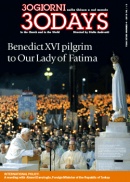Like a treasure that has long gone unseen
The crowd of half a million faithful who attended the Mass celebrated by Pope on the esplanade of the Shrine of Fatima on 13 May reminds us that in certain moments of Christian life an inner call bursts upon us that is overwhelming
Giulio Andreotti
![Pope Benedict XVI during Mass at the Shrine of Fatima on 13 May 2010 [© Associated Press/LaPresse]](/upload/articoli_immagini_interne/1279199303004.jpg)
Pope Benedict XVI during Mass at the Shrine of Fatima on 13 May 2010 [© Associated Press/LaPresse]
They are moments, images, that testify to the vitality of the Church that unexpectedly bursts forth in times that seem banal and without spiritual urges. At such times the Church seems so young as to not show the two millennia it has behind it, and we are saved by the cyclical ups and downs from judging the situation either with undue pessimism or euphoria somewhat heedless of the data of reality.
Two days earlier, on 11 May, the Pope had used harsh words saying that the greatest persecution of the Church does not come from enemies without, but arises from the sin of the Church. Very strong words, that reminded me not just of five years ago when the then Cardinal Ratzinger, in the days before the conclave, spoke of “filth in the Church”, but also of when Paul VI spoke of the “smoke of Satan within the Church”. But Pope Montini, while communicating a strong spiritual charge, was sometimes perceived as an intellectual. Perhaps that is why the phrase was taken by the Catholic people as a lofty judgment, but expressed on a merely cultural level. With Benedict XVI it was different this time. The spell and the grip of the present Pope on the Christian people, in fact, are not only linked to single occasions but have even greater value given the great many defects of the contemporary world.
Faced with a phrase of this kind, I feel as a Catholic that not only do we need to improve, but rather we need a full conversion of our lives as Christians and we must know how to tackle it properly. In fact I believe that the danger in a life of faith is laziness. Sometimes there are jolts from outside, a natural disaster that forces us to think of our fate, a persecution, but in everyday life we sometimes become complacent and even the fulfillment of religious duties derives more from bureaucratic belonging than from spiritual feeling.
That is why the touching demonstration of solidarity and affection for the Pope, that took place on 16 May in St Peter’s Square must not lead us to forget that the essential thing is to live our Christian life well. For everyone to do their duty, keeping to the right tracks, is crucial and gives strength, even the strength to interest and attract those who are distant. And sometimes, living one’s Christianity well has a visibility that goes beyond the most successful demonstrations, that some people, however, might use only as an argument for competing in public controversy, without perceiving the deeper meaning.
One final thought on the five years of pontificate that Benedict XVI celebrated on 19 April. I often note that the turnout at the Wednesday audiences continues to be considerable and above all heartfelt. At first, perhaps, there was a bit of prejudice on the part of the Italians because of the Pope’s German accent. But the enormous fascination that Benedict XVI stirs soon surmounted everything. What strikes me is Benedict XVI’s ability to communicate with the most diverse groups: from the common people who perceive the Church as charity and devotion, to the world of culture and science, to the leaders on the international scene.
I think the Pope’s concern will always be turned to reconciling what are purely spiritual and supernatural goals with the duties that Christians have in the world in which they live (and that does not consist of Franciscan tertiaries). And the tone that the Pope uses on all occasions, from the most solemn to the more routine, such as the Wednesday audiences, meets that expectation.
















